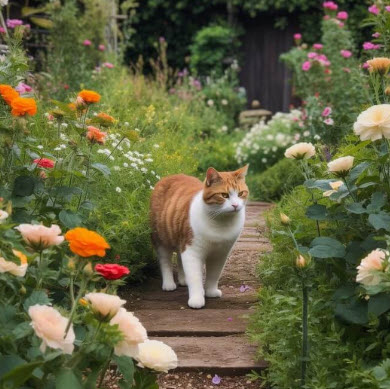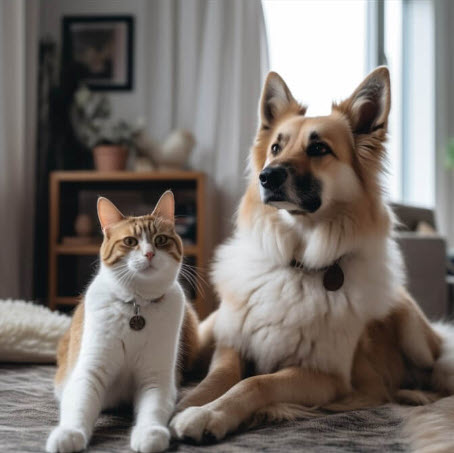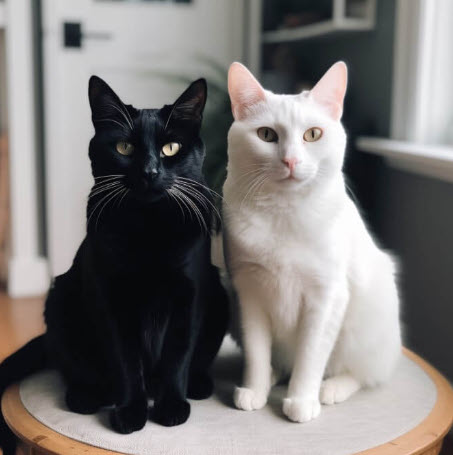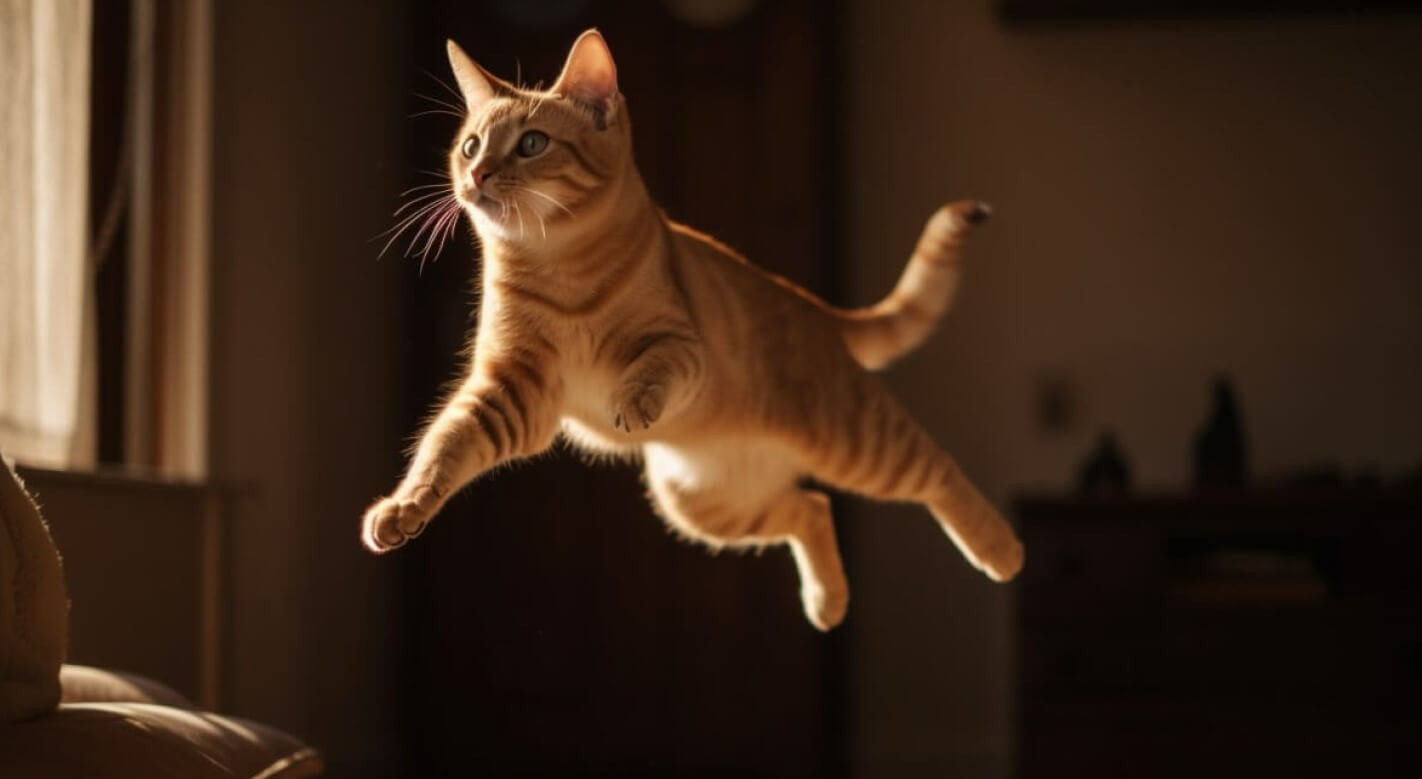Table of Contents
Common Myths about Cats – Introduction
This article will explore common myths about cats, from the plausible to the downright ridiculous. (There are many beliefs about cats, myths about cats and pregnancy, and several cats myths and superstitions).
For example, quite a famous one does the rounds about putting butter on a cat’s paws to easily find its way back to its new home.
No scientific evidence supports this claim, and it is not an effective method for locating lost cats. Microchipping and proper identification tags are more reliable ways to ensure lost cats return home.

Let’s explore some cat behaviour myths etc.
Common Myths About Cats A-Z
Cats always land on their feet:
While cats are extremely agile and have a natural ability to right themselves, they can still suffer from injuries or even death from falls.
Cats are low-maintenance pets:
While cats are generally independent, they still require regular care and attention, including feeding, grooming, and veterinary checkups.
Cats are nocturnal: While cats are naturally more active at night, they can adjust their sleep schedules to match their owners’ routines.
Cats should drink cow’s milk:
Adult cats are often lactose intolerant and can suffer from digestive problems if they consume milk.
Cats are solitary animals:
While cats are independent, they are also social animals and often enjoy the company of other cats.
Cats are not trainable:
Cats can be trained to do many things, including using a litter box, walking on a leash, and performing tricks.
Cats don’t need to be spayed or neutered:
Spaying or neutering your cat can prevent unwanted litters, reduce the risk of certain cancers, and improve behaviour.
Cats can see in total darkness:
While cats have excellent night vision, they still need some level of light to see.
Cats are always clean:
While cats are generally clean animals, they still require regular grooming to maintain their fur and hygiene.
Cats are not affectionate with children:
While some cats may be hesitant around young children, many cats are affectionate and playful with children if they are properly introduced and socialized.
Cats are always quiet:
While cats are known for their purring, they can also meow, hiss, growl, and make other vocalizations to communicate with their owners and other cats.
Cats can’t get along with dogs:
With proper introductions and socialization, cats and dogs can often learn to live peacefully together and even become good friends.

Cats don’t need regular exercise:
While cats are generally more sedentary than dogs, they still need regular exercise and play to maintain a healthy weight and prevent boredom.
Cats are not affectionate with their owners (this is now of the most popular common myths about cats).
Many cats enjoy spending time with their owners and show affection through purring, kneading, head-butting, and other behaviours.
Cats are not intelligent:
While cats may not be as trainable as dogs, they are still intelligent animals and can learn to problem-solve and perform complex behaviours.
Cats are unaffected by stress:
Cats can experience stress and anxiety, leading to a range of health problems if left untreated.
Cats can always find their way home:
While cats have a strong sense of direction and can navigate familiar territory, they can still become lost or disoriented.
Cats are always aloof and independent:
While some cats may be more independent than others, they still crave attention and social interaction from their owners.
Cats don’t need dental care:
Regular dental care is essential for cats to prevent dental disease and maintain overall health.
Declawing a cat doesn’t hurt it:
Declawing a cat involves amputating the end of the toe bone, which is a very painful procedure. After the procedure, cats often experience pain and discomfort, and in some cases, they may even suffer from long-term problems such as lameness, infection, nerve damage, and behavioural changes. (This is, in our view, one of the worst common myths about cats).
A human year is equal to seven cat years:
A cat’s first year is equivalent to 16 human years, while subsequent years are equivalent to 4-5 human years. A cat’s development is roughly equivalent to an additional 9-10 human years from its second year.
Cats only purr when they are happy:
Cats can purr for various reasons, including when they are content or in pain.
Cats can be fed a vegan diet:
Cats are obligate carnivores, meaning they must eat meat to get the essential nutrients that they need to survive. Cats require a diet high in protein and amino acids, specifically taurine, which are found mainly in meats. A vegan diet does not provide cats with all the necessary nutrients they need to stay healthy and can lead to malnutrition and other health issues.
Cat litter and female pregnancy:
The myth about a potential pregnancy risk from cat litter has arisen from discovering that a parasite often found in cat faeces, Toxoplasma gondii, can cause birth defects in humans. However, it is simple to avoid infection by delegating the litterbox cleaning to someone else, wearing gloves when cleaning the litterbox, washing your hands after handling your cat, and not eating or handling your cat at the same time.
Common Myths About Cats in Relation to Superstition, Witchcraft and Magic
Are cats good luck?
There are so many ancient myths about cats. Cats are symbols of luck, witchcraft and magic across cultures and history. The colour of a cat is also an important factor in the superstitions surrounding felines, as different colours have different meanings in various parts of the world.
In ancient Egypt, for instance, cats were worshipped as deities, and the colour of the cat was believed to hold a special significance. Moreover, black cats were considered to have mystical power and were thought to be able to ward off evil spirits. In fact, black cats were so revered that the Egyptians even developed a special breed called the “panther cat” to amplify their powers.
In Western cultures, black cats are often associated with bad luck and are said to bring misfortune if they cross your path. This superstition is so profound that black cats are sometimes avoided or shunned by people who fear their bad luck might rub off on them.
In Japan, Calico cats are believed to be symbols of good luck and prosperity. This belief stems from the reasoned argument that the word “calico” in Japanese sounds similar to the word for “money”, and so the cat is thought to bring financial good fortune.

In some cultures, such as in Russia, white cats are considered symbols of purity and are said to bring good luck and harmony to the home. In contrast, in some Asian cultures, white cats are associated with death and are thought to be the reincarnation of ghosts or spirits.
Overall, the colour of a cat is steeped in superstition and is often seen as a sign of good or bad luck. However, please remember that these beliefs are purely cultural and should not be taken too seriously. The reality is that cats are just cats, regardless of their colour!
………………………………………
If you require any assistance with this article, please do not hesitate to Contact Us
Help support the Cats Protection League with a monthly donation




















